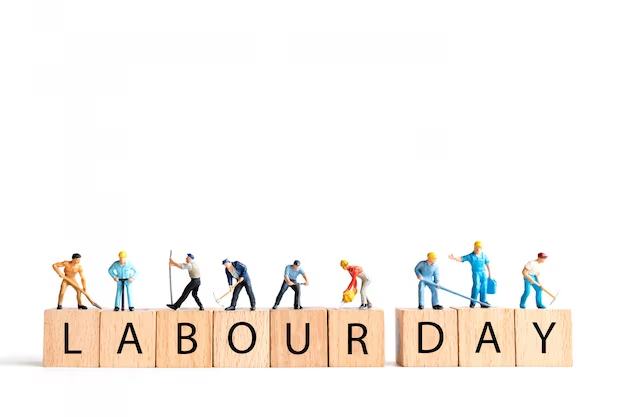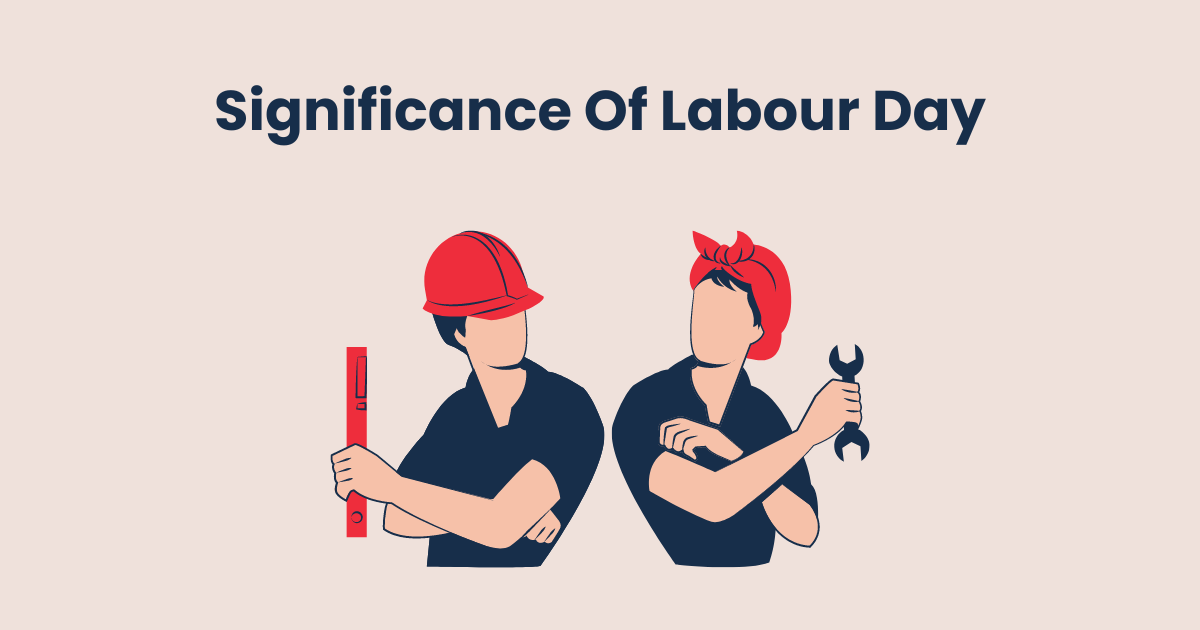As the first day of May graces our calendars, it brings with it the echoes of the past and a celebration deeply rooted in the struggles of workers. Labour Day isn’t just a springtime festivity; it’s a global acknowledgement of the labour force’s enduring spirit. In this blog post, let’s explore the significance of Labour Day and its activities and understand why this annual observance deserves more than just a casual nod.
Table of Contents
What Is Labour Day?
Labour Day, often known as International Workers’ Day, is a significant annual celebration observed on the 1st of May in many countries around the world. This day is dedicated to honouring and appreciating the contributions of workers and the labour movement.
May Day has historical roots that date back to the late 19th century when workers united to demand better working conditions, fair wages, and a reasonable workday. The date, May 1st, commemorates the Haymarket affair in Chicago in 1886, a pivotal event in the fight for workers’ rights.
Labour Day serves as a reminder of the achievements made by the labour movement and the ongoing struggles for workers’ rights.
| Aspect | Description |
| Date | Labour day is celebrated on the 1st of May |
| Origin | Labour Day is celebrated on the 1st of May |
| Purpose | Late 19th-century labour union movement |
| Activities | Parades, demonstrations, speeches, festivals, family gatherings |
| Global Reach | Celebrated in over 140 countries |
| Variations | May Day, International Workers’ Day, National Labour Day |
Significance of Labour Day
Labour Day serves as a simple yet impactful reflection on the value of work and the individuals who drive it. Delving into the significance of Labour Day reveals:

1/ Celebrating Workers’ Contributions – Significance of Labour Day:
Labour Day stands as a dedicated occasion to recognize the significant contributions made by workers across diverse professions. Whether it’s healthcare professionals, teachers, farmers, or firefighters, every occupation plays a pivotal role in shaping our economies, societies, and communities.
2/ Advocating for Workers’ Rights – Significance of Labour Day:
Labour Day goes beyond just a celebration. It’s a day that sheds light on the challenges faced by workers all over the world, including unfair labour practices, low wages, discrimination, and unsafe working conditions. This creates awareness and commitment to address these concerns.

3/ A Day of Solidarity – Significance of Labour Day:
When workers come together and speak up, they can make great progress. Labour Day is a reminder of the power we have when we unite. Not only does it enhance our own lives, but it also positively impacts others.
4/ A Call to Action – Significance of Labour Day:
More than a mere retrospective, Labour Day serves as a call to action for the future. It prompts a renewed commitment to building a world where every worker has the opportunity to thrive, contribute meaningfully to society, and enjoy the benefits of fair and just working conditions.
Significance of Labour Day – Labour Day represents an ongoing effort to uphold the dignity of labour, protect workers’ rights, and improve society as a whole through the collective efforts of the workforce.
Activities On Labour Day
Here are activities to celebrate Labour Day joyfully:
1/ Community Picnic:
Gather with friends, family, and neighbours for a joyful community picnic to celebrate Labour Day and enjoy the long weekend.

2/ Volunteer Work:
Spend part of your Labour Day weekend giving back to the community through volunteer activities, such as participating in local clean-up initiatives or assisting at a food bank.
3/ Outdoor Games and Sports:
Organize or join friendly outdoor games like tug-of-war, sack races, or soccer matches to promote camaraderie and physical activity.
4/ Labour Day Parade:
Attend a Labour Day parade in your local area to witness vibrant displays, floats, and performances celebrating the achievements of the labour movement.
5/ Family BBQ:
Host a family barbecue or join a neighbourhood grill-out to share good food and company while marking the occasion.

6/ Craft Fair or Farmers’ Market:
Explore local craft fairs or farmers’ markets happening over the Labour Day weekend to support local artisans and businesses.
7/ Cultural Events:
Check out cultural events like concerts, art exhibitions, or theatre performances happening in your community as part of Labour Day festivities.
8/ Labour Day Run/Walk:
Participate in a Labour Day run or walk event, promoting both physical activity and the spirit of the day.

9/ Family Movie Night:
Enjoy a relaxing Labour Day evening with a family movie night, either at home or by attending an outdoor movie event in your community.
10/ Visit a Historical Site:
Explore local historical sites or museums that highlight the history of the labour movement, providing an educational yet enjoyable experience.
You May Also Like:
11/ Local Concerts or Performances:
Attend local concerts, live music performances, or theatrical shows that showcase talent and celebrate Labour Day.
12/ Crafting for a Cause:
Engage in crafting activities, such as making thank-you cards or appreciation posters, to recognize the efforts of essential workers in your community.

13/ Family Nature Hike:
Take advantage of the long weekend by organizing a family nature hike, appreciating the outdoors, and spending quality time together.
14/ DIY Home Improvement:
Use Labour Day weekend as an opportunity for home improvement projects, adding a personal touch to your living space and symbolizing the value of labour.
These activities offer a variety of ways to celebrate Labour Day and make the most of the long weekend while keeping the spirit of the holiday in mind.
Conclusion
The significance of Labour Day lies in recognizing the dedication and contributions of workers across various fields. As we enjoy the celebrations and festivities, let’s carry with us the reminder that Labour Day is a tribute to the labour force and a symbol of the ongoing pursuit of fair treatment and respect for every worker.
More tips and advice about events? Pick an event that you’re concerned with, and we’ll give you a helping hand!
FAQs
Why is Labor Day so important?
It recognizes workers’ contributions, advocates for their rights, and highlights the importance of fair and safe working conditions.
What is the significance of International Labour Day?
It recognizes the significant contributions made by workers.
It shows global solidarity with workers everywhere.
It raises awareness about labour rights issues like low wages & unfair practices.
It calls for action to improve working conditions for all.
What are five facts about Labor Day?
Started in 1886 after a fight for an 8-hour workday.
Celebrated on May 1st in most countries.
US Labor Day is the last Monday of May.
Often involves parades, picnics, & family time.
Not just a day off but a reminder of workers’ importance
Ref: Navi | British Council | Wikipedia





